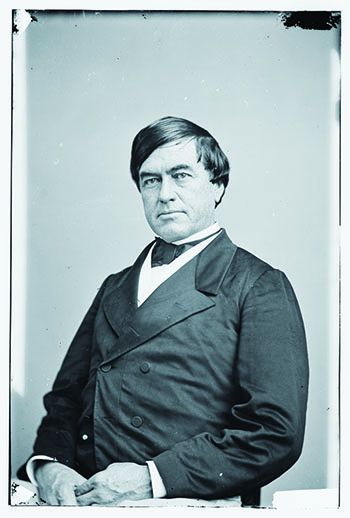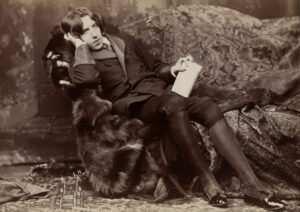
When in 1964 Louisville-born Cassius Marcellus Clay Jr., converted to Islam, taking as his name Muhammad Ali, the 22-year-old heavyweight boxing champion was casting off a monicker made legendary by another flamboyant Kentucky fighter given to dramatic pronouncements.
In 1845, Cassius Marcellus Clay of Lexington proclaimed himself first to “ever beard the monster in his den,” when he founded True American, an antislavery newspaper. Son of a prominent area planter, Clay had freed his slaves the year before. A realist, he fireproofed his print shop with iron, positioned two cannons at the door, and hung rifles on the wall. Clay’s hubris so inflamed neighbors that while he was sick at home a mob emptied the premises. Clay moved his printing operation to Cincinnati, continuing to edit at his Lexington office. Athletic and fearless, he stood 6’3”. After giving a speech in Texas denouncing slavery in 1849, he singlehandedly fought off six attackers.
Instead of retreating into wealth and the privileged life of a southern planter, Clay campaigned ardently against slavery, decrying its harm to blacks and to poor whites. His drive took him far beyond the comforts of his family’s estate, White Hall.
Clay served three terms in Kentucky’s legislature. He fought in the Mexican War, spending 18 months in Mexico City as a prisoner of war. When the first weeks of the Civil War found him in the nation’s capital, Clay organized a battalion of 300 volunteers to defend the White House. Twice during the 1860s he served as United States Ambassador to Russia, invoking Czar Alexander II’s freeing of 23 million serfs to prod President Abraham Lincoln toward issuing the Emancipation Proclamation.
Of Clay, a contemporary said, “Naturally pugnacious, he would fight the wind did it blow from the South side when he wanted it to blow from the North.” Clay’s father, Revolutionary War veteran and local politician Green Clay, lived near Louisville and owned several businesses and many slaves; his son’s contrary views had evolved in the North.
After attending Lexington’s Transylvania University, the younger Clay headed to Yale. On his path to graduating in 1832 he noted that in Connecticut every man could write “his name, and read his laws and his bible.” Abolitionist William Garrison’s speeches also inspired the young firebrand. “I determined to start a press of my own in the cause of liberation,” Clay recalled in a memoir.
Clay’s fiery opposition to slavery would come to encompass the system’s impact on whites. Slavery, he vehemently argued, hurt the South and its white workers. The North was “radiant with railroads, the channels of her untold commerce; whilst the South hobbles on at an immeasurable distance behind,” he said. Clay’s rhetoric foreshadowed today’s foes of undocumented immigration. “It is an evil to the free laborer, by forcing him by the laws of competition, supply, and demand, to work for the wages of the slave—food and shelter,” Clay said. “The competition of unrequited service, slave labor, dooms the laboring white millions of these states to poverty; poverty gives them over to ignorance; and ignorance and poverty are the fast high roads to crime and suffering.”
The pragmatic Clay, who hoped to end slavery peacefully, well knew what the peculiar institution inflicted on blacks. A particular incident seared him; he was friends in childhood with a young enslaved woman who as an adult killed a man in self-defense; though acquitted, she was sold South, customary for slaves with violent pasts.
After guarding the White House in 1861, Clay volunteered for military service. Lincoln, regarding him as too volatile to lead troops, suggested he become ambassador to Spain. Clay asked for and got the ambassadorship to Russia, returning from the first of two postings there before Lincoln’s 1862 action emancipating slaves in secessionist states. Clay said Lincoln, wanting to test public opinion, first sent him to poll Kentuckians. Within two months, Lincoln issued the Proclamation, the first decisive national step toward ending slavery.
Clay’s diplomacy kept Russia on the Union side during the war. In all he spent eight years in Russia, returning in 1869 with an “orphan” rumored to be his son by ballerina Maria Petipa, wife of legendary St. Petersburg choreographer Marius Petipa.
In its last decades, Clay’s life took bizarre turns. He and his wife divorced in 1878; her resulting impoverishment and homelessness helped galvanize their four daughters’ involvement in the women’s rights movement. In 1894, Clay, 84, briefly was wed to a 15-year-old. He spent his final years holed up and heavily armed at his estate—his nickname was “the Lion of White Hall”—and was declared insane before dying in 1903.
Awareness of Clay’s crusade has faded, but he left a stamp in Kentucky. Cassius Clay Sr., the boxer’s father, was named for him, and Berea College, founded on land that Clay had donated, opened its doors in 1855 to students of all kinds: black, white, male, and female. In 1912, the tuition-free institution reached out to needy students across Appalachia, a gesture recalling Clay’s antebellum interest in educating poor whites. Berea’s motto remains: “God has made of one blood all peoples of the earth” (Acts 17:26).
This story was originally published in the March/April 2017 issue of American History magazine. Subscribe here.





